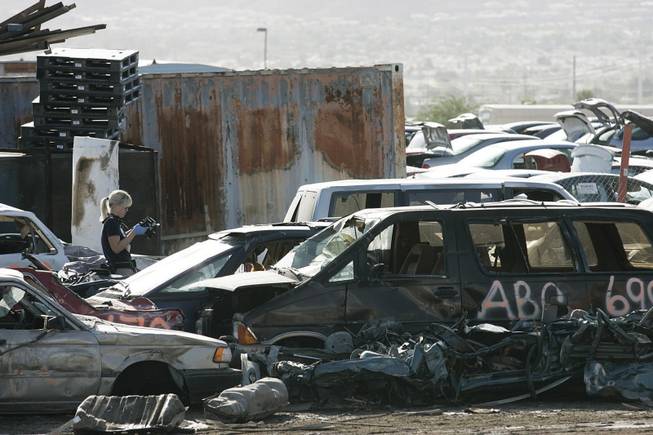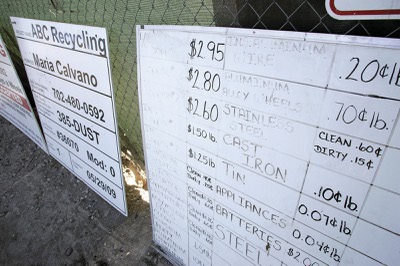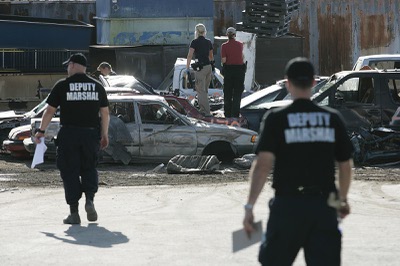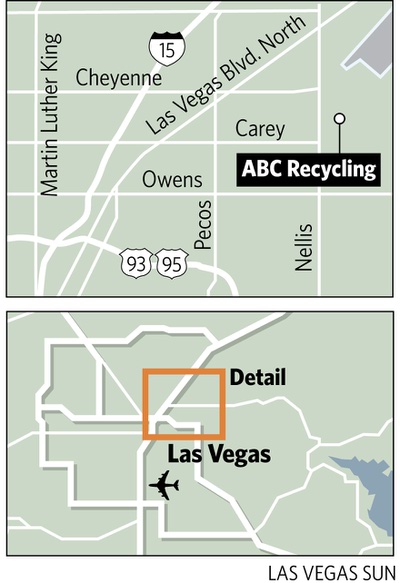
Junked vehicles pack a scrap lot at ABC Recycling in northeast Las Vegas as a Metro Police officer takes photographs during a daylong raid Wednesday. The owner of the business and two employees were taken in for questioning, but as of Wednesday evening, no arrests had been made.
Thursday, Aug. 14, 2008 | 2 a.m.
Daily metal exchange rates are posted outside ABC Recycling on an erasable white board that explains just how much a scrap seller will get for whatever he drags in: clean aluminum, 65 cents a pound; dirty aluminum, 10 cents a pound; copper grades 1-5, $1.25 to $2.95 a pound, and the list goes on. It’s the Nasdaq of junk.
Metro's proposed changes
Requiring scrap sellers to provide a fingerprint and current government photo ID to buyers, who must record the information with every transaction.
Mandating that all payment for scrap metal be made in the form of a check, sent to the address on the seller’s ID.
Requiring scrap buyers to inform police of every purchase made, not unlike pawnshops.
Requiring scrap buyers to tag and hold purchases for a set amount of time before metal can be compacted.
Those scrap metal sales came to an abrupt halt early Wednesday, however, when dozens of law enforcement officers from a variety of local and federal agencies raided two ABC lots in northeast Las Vegas, looking for proof that loot from two of the county’s most problematic crimes — scrap metal theft and auto theft — was knowingly being accepted, and compacted into unrecognizable metal blocks, by the company.
This was the first time Metro Police, who ran the show, have ever raided a scrap metal recycler. It’s a significant occasion — it was both the valley’s most aggressive attack on metal theft to date and a harbinger of things to come. Metro is pushing for new laws that would make it harder for scrap metal buyers and sellers to profit from the thievery, which has vexed the valley in all manner of costly ways in recent years, from street and highway lights left dark after wiring was pulled from them to air-conditioning systems atop buildings rendered useless after their copper tubing was ripped off.
Metro has been working on the proposed legislation with local politicians and law enforcement agencies since January. The plan is to loosely model Nevada’s scrap-buying regulations after laws enacted in Arizona last year. So far, the proposed changes include:
• Requiring scrap sellers to provide a fingerprint and a current government photo ID to buyers, who must record the information with every transaction.
• Mandating that all payment for scrap metal be made in the form of a check, sent to the address on the seller’s ID.
• Requiring scrap buyers to inform police of every purchase made, much as pawnshops do.
• Requiring scrap buyers to tag and hold purchases for a set amount of time before the metal can be compacted.
Arizona officials require sellers to provide ID, but only if they stand to make more than $25 on the sale. They require payments to be made by check if the scrap is worth more than $300.
Metro would like to eliminate these minimum cost provisions in the Nevada version because they wouldn’t prevent an ambitious metal thief from visiting multiple scrap yards in the same day to avoid detection.
The department will submit the strictest legislative proposal possible then wait to see how it’s received, according to Lt. Tom Roberts, Metro’s government liaison.
The current “cash and carry” operations of the scrap-buying industry make it almost impossible for Metro’s detectives to track illegal sales and purchases, particularly after the metal in question is compacted.
To get some idea of how desperate people have gotten in stealing and selling metals, consider the list of items ABC Recycling will not accept — it reveals what people have tried to turn in: shopping carts, water mains, beer kegs and anything that says “Fire Department” on it.
North Las Vegas Assistant Fire Chief John Oceguera, who is also a state assemblyman, has been part of the team working on the proposed legislation. He brought representatives from Nevada Power, homebuilders associations, the district attorney’s office and various municipalities to the table.
Oceguera would like to see the penalty for stealing more than $500 worth of metal increased by making the crime a felony. He has watched his department put out house fires that were started by metal thieves. The arson, you see, got firefighters to tear down drywall while fighting the flames. After firefighters left, pulling all the copper wiring out of the house was relatively easy.
More than 25 states enacted stricter regulations on the sale of scrap metals last year. In Alabama, scrap metal sellers must sign a waiver swearing the metal isn’t stolen. In Colorado, buyers must take down the license plate numbers of sellers and hold each purchase for no less than five days so police can examine the scrap if they think it’s stolen. In Connecticut, scrap metal buyers have to take a picture of the car delivering the metal. And in Georgia, people convicted of stealing scrap metal have to pay full restitution to the owner — not just the salvage value of the metal, but the cost of replacing what was stolen: wiring, piping, an air conditioner.
If Nevada wants to follow in the footsteps of Arizona and require scrap buyers to inform police of every purchase, law enforcement agencies should prepare themselves for an onslaught of information. Last week alone, for example, 2,826 scrap sale transactions were entered into a database tracking the sales. Arizona authorities say it’s impossible to quantify the success of the new laws, because they are so new, but they can advise Nevada officials on at least one point: Don’t let the scrap buyers fax in their records. The paperwork burden has been a disaster for the state, and it is writing up legislation to mandate e-mail filing.
One Las Vegas metal recycler admitted, on condition of anonymity, that it’s obvious who is selling illegal scrap metal. The scrap buyer also said that until all scrap recyclers agree to turn away illegal sales, doing so would be business suicide. And while it wouldn’t be a problem to start fingerprinting all sellers and sending out checks, he said, it would be nice if the government paid for new computer processing systems to make the changes.
At Wednesday morning’s raid, police took away three ABC employees, including the owner of the business, for questioning. An ABC employee told the Sun no one from the company was available for comment Wednesday afternoon.
No arrests had been made as of Wednesday evening, though that doesn’t mean there won’t be prosecution, according to Lt. Bob DuVall, who leads the department’s auto and construction theft units. At the ABC lot on Betty Lane, DuVall’s two greatest policing preoccupations, auto and metal theft, were lumped into one: stolen cars being sold for scrap metal.
The latest trend, DuVall said, is thieves’ cutting stolen cars in half, then selling the half without the vehicle identification number for scrap. This makes it impossible to identify as stolen, and nets thieves $150 to $200.
By 9 a.m. Wednesday, teams of police were crawling through the scrap lots, boxing up evidence and using orange forklifts to hoist confirmed stolen cars onto large flatbed trucks. Watching police scramble from one car to another, DuVall said, not at all unhappily, that the raid would go into the evening and the subsequent investigation would take weeks.




Join the Discussion:
Check this out for a full explanation of our conversion to the LiveFyre commenting system and instructions on how to sign up for an account.
Full comments policy